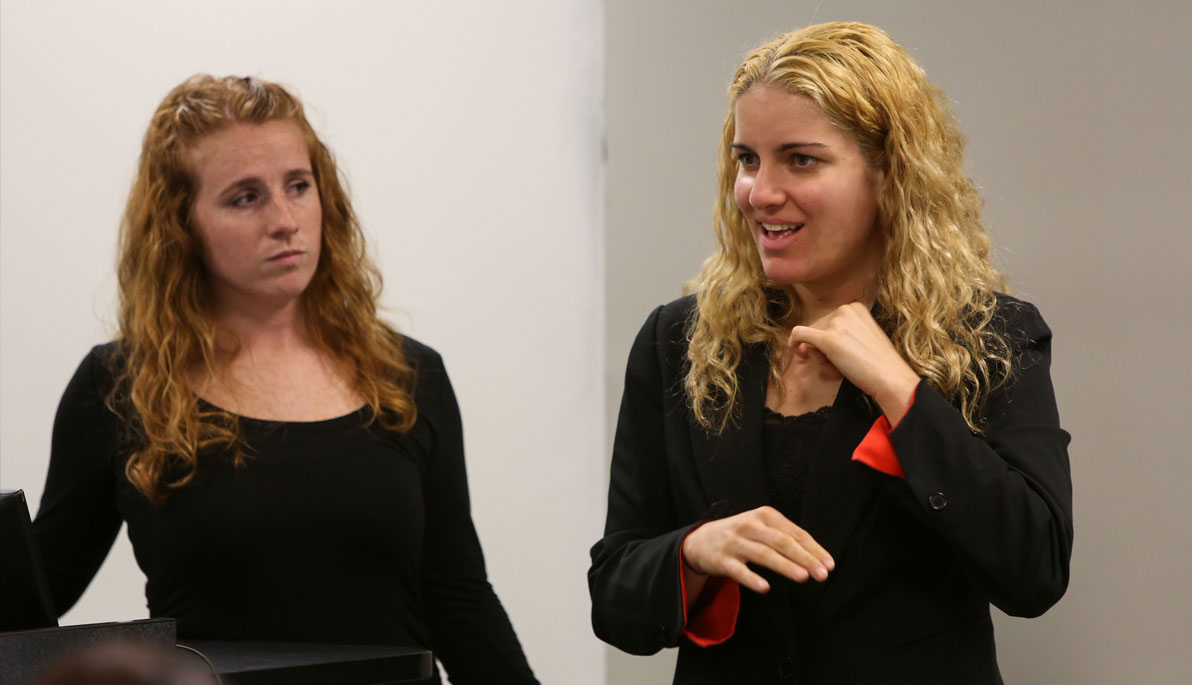
NYIT Student Explores Novelty-Seeking Behaviors and Addiction
October 15, 2015
While the bustle of Columbus Circle stirred below, room 822 was quiet in 16 W. 61st St. The crowd, a mix of behavioral science classmates and the friends and family members who came out to support them, was focused on two things: the link between impulsive behavior and the onset of addiction, and the commanding researcher leading the conversation: Adriana Antoci, a behavioral sciences student at NYIT.
Antoci relayed her presentation—"Impulsivity and Novelty-Seeking Behavior Through Addiction"—through a team of translators at NYIT's 2015 Symposium of University Research and Creative Expression. When the class wanted to acknowledge agreement, they pounded lightly on the desk in unison, so Antoci could feel the vibration. Born deaf and mute, with slowly deteriorating sight, Antoci has developed an innovative—and captivating—method of communicating with her classmates.
"Sign language is her first language, and she has adapted her sign language so it is a felt language rather than a seen one," said Assistant Professor Blair Hoplight, who led the presentation and the Introductory Research Methods for BES course for which Antoci’s project was developed. "When you sign to her she has to feel it."
The study itself was born of Antoci’s curiosity about early indicators of addiction, including how age of first exposure to addictive substances and behaviors related to the development of addictions in the future. For the purpose of the study, "novelty seeking" was defined as a personality trait associated with exploratory activity in response to novel stimulation, impulsive decision making, extravagant approaches to reward cues, and quick loss of temper and avoidance of frustration.
Working with Hoplight, Antoci honed in on a research question that sought to illuminate how people develop addictions at a young age. Using Survey Monkey, she collected self-reported data on novelty-seeking behaviors and the age of respondents' first exposure to various addictive behaviors. To recruit a larger sample, she encouraged participants to share the survey with their networks in a method known as "snowball sampling."
The resulting data added more support to the growing body of research linking novelty-seeking behaviors and addiction. The results indicate that impulsivity and other novelty-seeking traits are “reliable as a predictor of some behaviors that may lead to addiction, including drug use,” Antoci concluded. "The research didn’t find sex differences or demographic differences. The survey may be a useful diagnostic tool as an indirect measure of potentially risky behaviors."
By Kate McCormick
More Features

An Alumnus’ Commitment to the Environment
As an energy management graduate from New York Tech’s Vancouver campus, Jasdeep Gulati (M.S. ’22) is highly invested in educating people about environmental and climate sustainability.

Vancouver Faculty Win University-Sponsored Research Awards in New Program
The new Global Impact Research Grant (GIRG) program has been developed to keep Vancouver-based faculty connected to faculty and research projects being conducted on the university’s New York campuses.

Studying Climate Change One Degree at a Time
Junhua Qu (M.S. ’24) began her collegiate journey in Beijing. But, her interest in climate change took her to New York Tech’s Vancouver campus to study energy management.